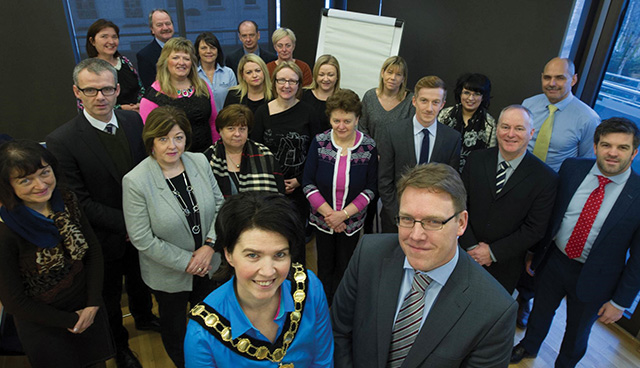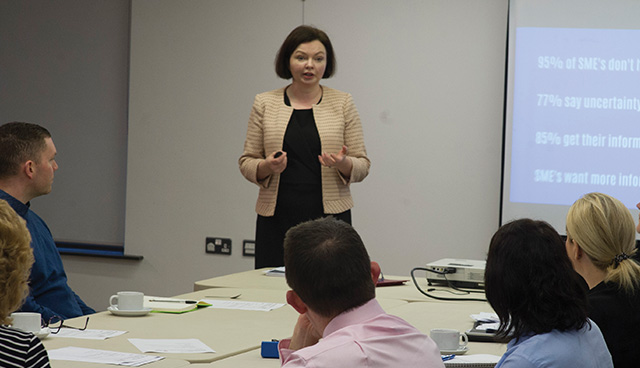A novel approach to tackle employability and skills in Mid Ulster

How Mid Ulster, Northern Ireland’s most entrepreneurial region, is blazing the trail to address employability and skills issues through a new Skills Forum.
Recently re-confirmed as Northern Ireland’s most entrepreneurial region, Mid Ulster is home to significant global business, cutting-edge industries and ambitious SMEs across a broad range of sectors from agri-food to retail.
So just how is the area planning to ensure that one of the key drivers for its continued strong economic growth – a high performing workforce, equipped with the right skills to meet current and future industry needs – is assured?
The answer: an industry-led Skills Forum.
Established in 2017 by Mid Ulster District Council, the Mid Ulster Skills Forum is the first industry-led, area-based body of its kind in Northern Ireland and has its roots firmly in both the Council’s progressive economic development strategy and the region’s Community Plan.
The 30-strong partnership, which draws its membership from local businesses, colleges, universities, enterprise agencies, key sectoral business organisations, government departments and the Council, is speaking as one voice to take forward its skills agenda in a focused and co-ordinated manner.
Business at the helm was the obvious option, according to Chair of Mid Ulster District Council, Councillor Kim Ashton: “While as a Council we have a direct role to play in growing our local economy, we recognise that it is the business community which must drive this aspect of our economic development strategy and that is where the Skills Forum has its origins.
“There is a clear commitment and a desire to effect tangible change which ultimately will bring growth and prosperity for the district.”
Alan McKeown, Corporate Services Director with Dunbia, Dungannon, who has been appointed Chair of the Skills Forum, said: “I commend the Council for being pro-active and establishing the Forum, which is another great example of the Council following through on the commitments it has made in its economic development strategy.
“As one of the largest employers in the Mid Ulster district, Dunbia already collaborates with a number of local education and training partners to develop skills in our people.
“Through the Forum we see the opportunity to work alongside the Council, other employers and our education partners, to help shape the future strategy for skills development in Mid Ulster, which is vital if we are to sustain economic growth in our area.”
So, what is the Forum’s skills and employability agenda? It is working towards two long-term outcomes:
1. Closing the skills gap through stronger partnership working with business, education providers and relevant government agencies; and
2. Positioning the Mid Ulster region as a stronger place for business and investment.
As befits an industry-led body, one of the Forum’s first tasks has been to commission a piece of industry-led research.
Designed to clearly define the gaps in workforce skills, the research is tailored to key business sectors in Mid Ulster including agri-food, manufacturing and engineering, construction, retail, IT and hospitality, as well as new and emerging sectors with growth potential.
The resulting skills report and action plan will, according to Mr McKeown, be a critical piece of work: “To date much research has been undertaken at a regional level. However, there is a significant gap in information on this issue at a sub-regional level.
“We know from previous Mid Ulster-based consultations that we need to address the specific needs of Mid Ulster to benefit our competitiveness, our ability to sustain and increase employment, and our economy’s success.”
Alongside the research, the Forum is also prioritising its consideration of other issues, specifically apprenticeships, engagement and linkages with education, and, unsurprisingly, Brexit – with other areas of work including lobbying, fundraising and ensuring skills development supports inward investment in the medium-term plan.
Mr McKeown says: “One of the key challenges is to promote stronger engagement and co-operation between education and industry.
“There is a clear commitment and a desire to effect tangible change which ultimately will bring growth and prosperity for the district.”
“Everyone and, in particular young people, must be encouraged to reach their full potential and to do that they need access to clear and relevant pathways, including apprenticeships to employment which reflect their own interests and skills, as well as the workforce needs of the local economy.
“We can only create that environment by forging strong, practical and measurable linkages between employers, educators and future employees.”
Brexit?
“Undoubtedly, Brexit will bring both unique challenges and opportunities given Mid Ulster’s location and, among other things, the fact that our unemployment benefit claim rate is one of the lowest in Northern Ireland,” he adds.
“This means we have a strong demand for labour and a low availability of unemployed. Mid Ulster could suffer a disproportionately high impact if access to migrant labour were to become a problem as a consequence of Brexit.
“The Forum is considering the impact of Brexit holistically with business and education, as well as sectoral bodies including FSB, Manufacturing NI, and NIFDA.”
Concluding, Mr McKeown says: “We all know the challenges that the Mid Ulster District faces as a largely rural area, but also know that we are a region with unprecedented entrepreneurial spirit and success. The newly formed Skills Forum has a unique opportunity to develop an indusrty-led approach to employability and skills which will help to achieve future economic prosperity in the Mid-Ulster area.”
For more information about the Mid Ulster Skills Forum please contact Fiona McKeown, Head of Economic Development:
E: fiona.mckeown@midulstercouncil.org
T: 03000 132 132








